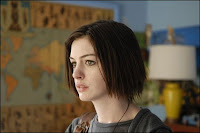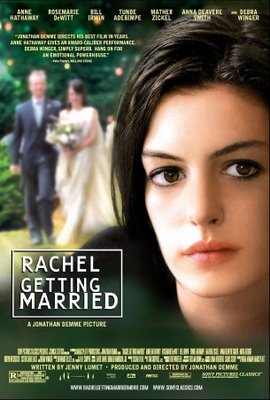Welcome to our new feature, “Ripley’s Pick of the Week.” Each week, we’ll showcase a film that passes Ripley’s Rule, aka The Bechdel Rule.
Ripley’s Pick of the Week
Rachel Getting Married. Starring Anne Hathaway, Rosemarie DeWitt, Bill Irwin, Tunde Adebimpe, and Debra Winger. Written by Jenny Lumet. Directed by Jonathan Demme.

Rachel Getting Married isn’t your typical wedding movie. The film takes place over the course of a weekend, where the audience watches Rachel’s wedding unfold, complete with uncomfortable wedding speeches, recovering addicts, and live music playing in the background at all times. But the film isn’t about Rachel’s wedding—it’s about the awkward and often heartbreaking family dynamics at play, particularly among Rachel (Rosemarie DeWitt), her perpetually-rehabbed-since-adolescence sister Kym (Anne Hathaway), and their absent mother Abby, played (amazingly) by Debra Winger.
The film centers around Kym, fresh out of rehab in time for her sister’s wedding. (Interestingly, it isn’t clear whether she’s let out of rehab only to attend the wedding, or if she’s out for good, which lends an uncomfortable urgency to the weekend.) When she shows up  at home, in the typical heavy black eyeliner and choppy haircut reserved especially for onscreen female addicts, it’s immediately obvious that her family views her as out of control and unpredictable—for good reason. She demands to be the maid of honor. She references her twelve-step program during her rehearsal-dinner speech. She seduces the best man (who she initially meets in a Narcotics Anonymous meeting) in the first fifteen minutes of the movie.
at home, in the typical heavy black eyeliner and choppy haircut reserved especially for onscreen female addicts, it’s immediately obvious that her family views her as out of control and unpredictable—for good reason. She demands to be the maid of honor. She references her twelve-step program during her rehearsal-dinner speech. She seduces the best man (who she initially meets in a Narcotics Anonymous meeting) in the first fifteen minutes of the movie.
 at home, in the typical heavy black eyeliner and choppy haircut reserved especially for onscreen female addicts, it’s immediately obvious that her family views her as out of control and unpredictable—for good reason. She demands to be the maid of honor. She references her twelve-step program during her rehearsal-dinner speech. She seduces the best man (who she initially meets in a Narcotics Anonymous meeting) in the first fifteen minutes of the movie.
at home, in the typical heavy black eyeliner and choppy haircut reserved especially for onscreen female addicts, it’s immediately obvious that her family views her as out of control and unpredictable—for good reason. She demands to be the maid of honor. She references her twelve-step program during her rehearsal-dinner speech. She seduces the best man (who she initially meets in a Narcotics Anonymous meeting) in the first fifteen minutes of the movie. If Kym encap sulates the bad-girl cliché, Rachel embodies the opposite. She’s sweet, in love, studying Psychiatry, and even her future in-laws describe her as an angel. Rachel’s earnestness, particularly in the scenes with her fiancé and her mother (it’s clear she craves her mother’s love and approval), works well juxtaposed with Kym’s constant biting sarcasm. While Kym seems to steal the attention of her parents by playing up her wildness and forcing them to acknowledge her, Rachel seeks it more sincerely, for instance by subtly letting her mother know she’d like her to contribute more than just the flower arrangements to her wedding ceremony.
sulates the bad-girl cliché, Rachel embodies the opposite. She’s sweet, in love, studying Psychiatry, and even her future in-laws describe her as an angel. Rachel’s earnestness, particularly in the scenes with her fiancé and her mother (it’s clear she craves her mother’s love and approval), works well juxtaposed with Kym’s constant biting sarcasm. While Kym seems to steal the attention of her parents by playing up her wildness and forcing them to acknowledge her, Rachel seeks it more sincerely, for instance by subtly letting her mother know she’d like her to contribute more than just the flower arrangements to her wedding ceremony.
 sulates the bad-girl cliché, Rachel embodies the opposite. She’s sweet, in love, studying Psychiatry, and even her future in-laws describe her as an angel. Rachel’s earnestness, particularly in the scenes with her fiancé and her mother (it’s clear she craves her mother’s love and approval), works well juxtaposed with Kym’s constant biting sarcasm. While Kym seems to steal the attention of her parents by playing up her wildness and forcing them to acknowledge her, Rachel seeks it more sincerely, for instance by subtly letting her mother know she’d like her to contribute more than just the flower arrangements to her wedding ceremony.
sulates the bad-girl cliché, Rachel embodies the opposite. She’s sweet, in love, studying Psychiatry, and even her future in-laws describe her as an angel. Rachel’s earnestness, particularly in the scenes with her fiancé and her mother (it’s clear she craves her mother’s love and approval), works well juxtaposed with Kym’s constant biting sarcasm. While Kym seems to steal the attention of her parents by playing up her wildness and forcing them to acknowledge her, Rachel seeks it more sincerely, for instance by subtly letting her mother know she’d like her to contribute more than just the flower arrangements to her wedding ceremony.What’s great about the film though, is that the characters prove to be much more complicated than this. T he audience recognizes from the beginning that something isn’t quite right with this family—why is Kym in and out of rehab? Why do their divorced parents feel so awkward around each other? And why does Abby seem so obviously uncomfortable around her daughters, especially Kym? It’s not long before Kym, in her NA meeting, reveals the family tragedy haunting their family. The scene works well, and Hathaway is brilliant here, because, in Kym’s telling of the tragedy, we begin to see her vulnerability, and the audience gains a broader understanding of the guilt, sadness, even the self-loathing that each family member struggles with.
he audience recognizes from the beginning that something isn’t quite right with this family—why is Kym in and out of rehab? Why do their divorced parents feel so awkward around each other? And why does Abby seem so obviously uncomfortable around her daughters, especially Kym? It’s not long before Kym, in her NA meeting, reveals the family tragedy haunting their family. The scene works well, and Hathaway is brilliant here, because, in Kym’s telling of the tragedy, we begin to see her vulnerability, and the audience gains a broader understanding of the guilt, sadness, even the self-loathing that each family member struggles with.
 he audience recognizes from the beginning that something isn’t quite right with this family—why is Kym in and out of rehab? Why do their divorced parents feel so awkward around each other? And why does Abby seem so obviously uncomfortable around her daughters, especially Kym? It’s not long before Kym, in her NA meeting, reveals the family tragedy haunting their family. The scene works well, and Hathaway is brilliant here, because, in Kym’s telling of the tragedy, we begin to see her vulnerability, and the audience gains a broader understanding of the guilt, sadness, even the self-loathing that each family member struggles with.
he audience recognizes from the beginning that something isn’t quite right with this family—why is Kym in and out of rehab? Why do their divorced parents feel so awkward around each other? And why does Abby seem so obviously uncomfortable around her daughters, especially Kym? It’s not long before Kym, in her NA meeting, reveals the family tragedy haunting their family. The scene works well, and Hathaway is brilliant here, because, in Kym’s telling of the tragedy, we begin to see her vulnerability, and the audience gains a broader understanding of the guilt, sadness, even the self-loathing that each family member struggles with.
Rachel’s and Kym’s father Paul (Bill Irwin) shouldn’t be left out of the discussion, as he has an integral role, obsessing over Kym’s whereabouts, her safety, her health. Because of this, he’s often the catalyst for arguments between Rachel and Kym—Rachel despises that Kym has always taken up his attention, and Kym can’t stand Rachel’s over-analysis. Ultimately though, the film fascinated me because of its treatment of the female characters and how they interact with one another. There’s no sentimentality here; in fact, the realness of their interactions makes for seriously uncomfortable viewing. But it’s the kind of uncomfortable viewing I couldn’t recommend more highly.
Watch the trailer here.

I’m glad to see Anne Hathaway digging into something more substantial than her usual fare. She didn’t quite pull meanness off in The Devil Wears Prada (nor did the movie, for that matter), so I’d like to see her get mean for this part. Might see this one in the theatre yet.
I agree with Steph’s take on this one and too, with Amber about Hathaway. Too often, she is cast as sweet, pretty or roles where she’s soft at what could be good, jagged, ugly. Here, she’s on and the complications and subtleties leave no one character too good nor too villified. (Save for Rachel’s best friend, who was the classic manipulative bitch and not given much complexity.)
This comment has been removed by a blog administrator.